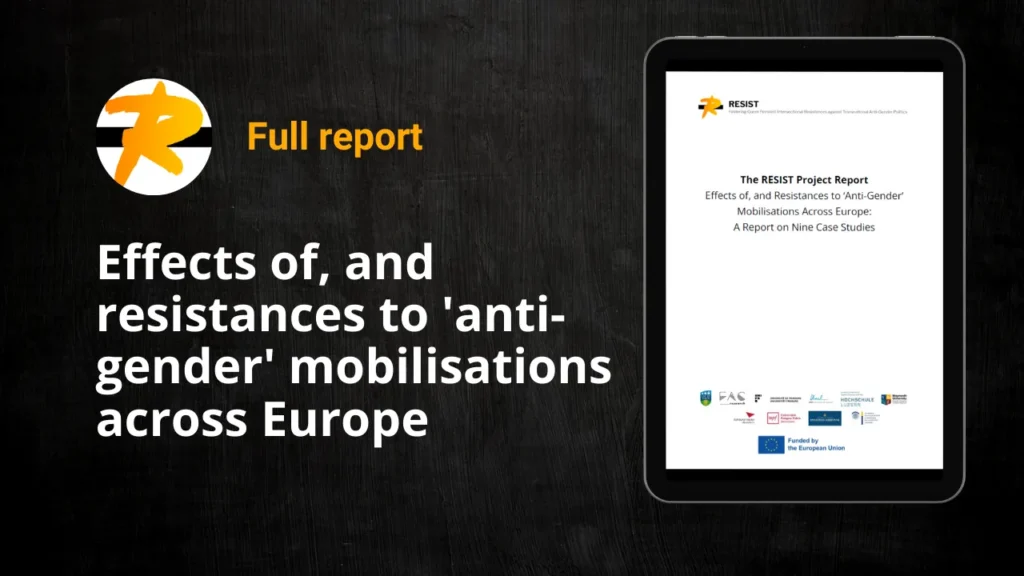About the RESIST project
What is ‘anti-gender’ politics?
From the comments section on the Internet to the halls of power where political decisions are made, ‘anti-gender’ actors question the validity of gender and sexual diversity—or, even more broadly, any kind of diversity. Sexism, misogyny, homophobia, and transphobia are mustered by the same actors that mobilise racism, ableism, and anti-immigrant sentiments.
Anti-gender’ mobilisations imperil gender and sexual equality, the inclusion of trans* and nonbinary people, multiculturalism, and academic freedoms.
‘Anti-gender’ politics is a complex phenomenon, present across Europe and spanning from illiberal and authoritarian regimes to those considered liberal and democratic. Studying such a complex issue requires an equally intricate, well-executed research project.
How do we research ‘anti-gender’ mobilisations across Europe?
Funded by the European Union, our project RESIST: Fostering Queer Feminist Intersectional Resistances against Transnational Anti-Gender Politics was designed to address ‘anti-gender’ politics as a multifaceted phenomenon that imperils gender and sexual equality, as well as legitimacy of critical knowledge in contemporary Europe.
At RESIST, we work as an international consortium of researchers spanning 10 institutions across Europe. We represent multiple disciplines including human geography, sociology, social policy, media studies, gender studies, feminist political philosophy, and education.
This interdisciplinary expertise and an intersectional queer-feminist ethos allows us to effectively explore the effects that ‘anti-gender’ politics have on people’s lives and the impact of these lived experiences on strategies of resistance.
RESIST Research Design
To make sure we make the most effective use of our time and skills, and produce impactful results, we divided the research into five stages planned over a course of four years:
Stage 1: Map
To understand how ‘anti-gender’ politics are produced and expressed in contemporary Europe, from late 2022 until the end of 2023, we analysed hundreds of parliamentary debates and thousands of media articles published between 2016 and 2022.
We narrowed our focus to four national case studies—Poland, Hungary, Switzerland, and the UK—while simultaneously exploring ‘anti-gender’ discourses on a transnational level, as they surface in the European Parliament.
Curious about what we’ve found? Download our 30-page Anti-Gender Tactics in Europe and use RESIST insights to inform your activism, journalism, policy making, or academic work.
If you want to know even more, you can also consult our almost 500-page publication National and Transnational Reports on the Formation of Anti-Gender Politics. This extensive report introduces the transnational context and provides in-depth insights on all case studies from the first stage of the RESIST project.
Stage 2: Listen
After the mapping exercise was completed, it was time to move on to the next stage of RESIST. In 2024, we organised interviews, focus groups, and surveys in nine case studies to understand the effects that ‘anti-gender’ politics has on people’s everyday lives, and what strategies they employ to counteract these effects.
At this stage, we focused on amplifying the voices of people who experience ‘anti-gender’ violence in Belarus, France, Germany, Greece, Ireland, Poland, Spain (Catalonia & Basque Country), Switzerland, and those living in exile across Europe.
The RESIST Project Report: Effects of, and Resistances to ‘Anti-Gender’ Mobilisations Across Europe: A Report on Nine Case Studies is your go-to report for findings from all case study contexts.
Individual context reports
In addition, we’ve also prepared separate reports that provide a quick yet intimate glimpse into each of the contexts. Follows these links for easy access to case study reports (in English):
Stage 3: Collaborate
In early 2025, we hosted workshops in the case study countries from Stage 2 to bring together 40 queer-feminist collectives and organisations across Europe.
By engaging stakeholders in the research process, RESIST empowers them to actively participate in the creation of project results and outcomes.
As such, our task was to facilitate generating collaborative research about existing strategies against ‘anti-gender’ politics. Through this effort, we hope to form the basis of a coordinated strategy for a transnational, intersectional, queer-feminist network that would nurture the exchange of ideas and resources.
Stage 4: Learn
In the fourth stage of the RESIST project, our task is to re-evaluate the existing theories against the lived experiences and practices that we have identified so far. Together with our partners, we will generate concepts and tools that respond to anti-democratic threats related to ‘anti-gender’ mobilisations.
Stage 5: Share
Lastly, we will share the findings, toolkits and resources to support those who seek to create more democratic societies. In collaboration with our partners, RESIST will offer a robust knowledge base and useful and relevant tools for community organisations and groups, policymakers and local authorities, and those who seek to create real world change within and beyond Europe.
Why do we do it?
We want to strengthen democracy by developing feminist strategies and theories. Through these strategies, the RESIST’s team aspires to empower civil society organisations and marginalised social groups, making societies across Europe more inclusive and egalitarian.
RESIST aims to enable attitude shifts across Europe and beyond by providing solid information, amplifying the lived experiences of gender and sexual minorities, and generating counternarratives that encourage human connection and understanding.
By working towards inclusive citizenship and safeguarding fundamental rights through countering ‘anti-gender’ mobilisations via feminist cross-sectoral collaborations, RESIST works to improve democratic engagements and inclusions for people marginalised by their intersectional gendered experiences.
What’s next?
We are particularly excited about some of our upcoming impact and advocacy activities. Here are some of the things we have planned for RESIST’s near future:
Massive Online Open Course (MOOC): Through a strategically designed online learning module and concise video digests, we want to give educators and DEI experts the pedagogical tools that influence pro-democratic, egalitarian, anti-sexist, antiracist, anti-homophobic, and anti-transphobic attitudes.
Documentary: We have commissioned a research-based documentary film designed to reach broad and diverse audiences, generating better understanding about the threats of ‘anti-gender’ mobilisations to democracy and people’s overall individual and collective well-being.
Advocacy: Through collaborations, we want to reach civil servants, public administrators, and decision-makers across parliaments, ministries, and cabinets, highlighting aspects of RESIST’s research and sharing toolkits that can influence policies on both local and EU-level.
In short, we are here to drive social change and we’re excited to see how our research outputs, advocacy, and communication activities are going to change the world around us.
Stay in touch
Interested in staying up to date with RESIST blogs, articles, press releases, reports, and events?
Check out our Resources page where we’ve collected links to all RESIST materials and sign up for RESIST Newsletter to stay in the loop and never miss an update.

